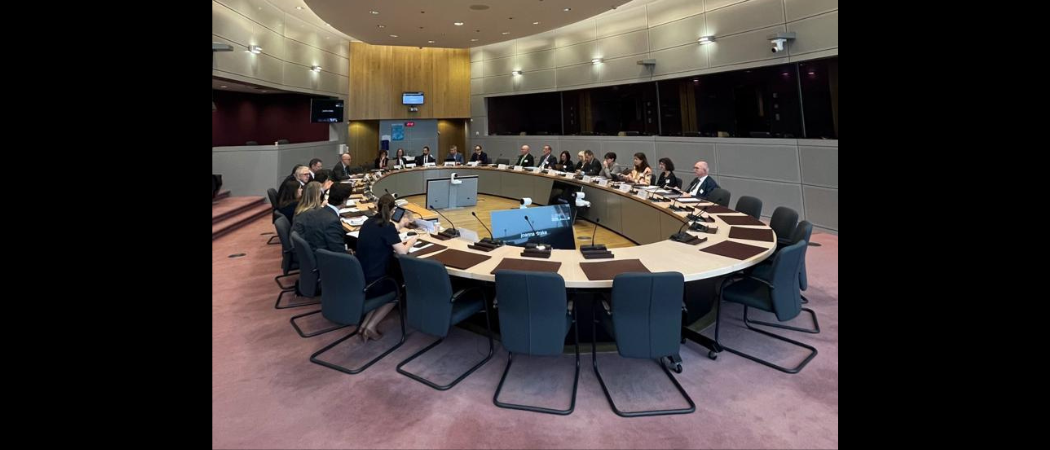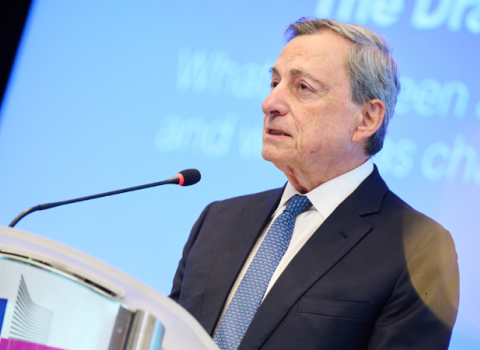Portugal’s former research minister, Manuel Heitor, will chair the group advising the Commission on the next seven-year EU research programme. The group will be striving for impact - and the budget will be a critical issue, Heitor tells Science|Business

The European Commission's expert adviser group for Framework Programme 10. Photo: European Union
The European Commission has assembled an independent adviser group for the EU’s next research programme, officially kicking off the drafting process for Framework Programme 10.
The group will be chaired by Portugal’s former research minister Manuel Heitor, who is one of Europe’s biggest advocates for fairer and better research careers.
Other names include Maria Chiara Carrozza, president of Italy's national research council; Conny Aerts, recipient of the 2022 Kavli Prize in astrophysics; and Georg Schütte, head of Germany’s biggest private science funding body, the Volkswagen Foundation.
The group is modelled after the expert group led by Pascal Lamy, which advised the Commission on the current €95.5 billion Horizon Europe. It will be one of the most influential voices in the process of formulating the successor programme, FP10.
By next October the group will deliver a report, which will be one of two key documents guiding the Commission on how to shape its proposal for FP10, to be presented mid-2025. Member states are working on their own report in the European Research Area and Innovation Committee (ERAC). Science|Business obtained an early look at their draft plans in October.
Working out how to spend billions of euros on European research won’t be easy this time around. Hopes are high for R&I to contribute to key political priorities as the EU pushes to meet its green and digital goals, but currently member states are showing little appetite for investment.
A battle over the size of the FP10 budget is brewing: the European Parliament, alongside the R&I community, has kicked off a campaign for a €200 billion ringfenced research budget, while member states are actively pondering cuts to the existing €95.5 billion programme.
Heitor’s priorities
The Heitor group kicked off the year-long process that will lead to a report with a meeting today.
There’s a lot of ground to cover and the first item on the agenda is making sure the advisers talk to everyone, from the research community, to the Commission, to politicians. “My main role is to guarantee a trust-building process with stakeholders so that we can produce a report that has impact,” Heitor told Science|Business.
He promises the group’s work will be ambitious but measured. There’s lots in the EU’s research landscape that already works well, with framework programmes successfully fostering collaborative research for 40 years. A number of newer initiatives, such as the European Research Council (ERC), have also proven themselves.
But there may be room for more. “We need to figure out what is still missing and what things we need to recommend,” says Heitor.
The group won’t shy away from talking about money. Heitor is vocal about the need to meet the promise to invest 3% of European GDP on research and innovation by 2030. Right now, spending is stagnating but he says the commitment must be honoured. “We will produce a recommendation, and the budget will be a critical issue, at least to guarantee the 3% target by 2030,” Heitor said.
He promises to take up the issue with finance ministers, who have often stood in the way of boosting national budgets for R&I despite repeated calls for support from the science community.
Second, Heitor is one of Europe’s most influential voices on the need to improve research careers, spearheading the recent manifesto, which led the Commission to introduce a plan to improve research jobs in July. In a show of commitment, the member states are set to jointly endorse the plan at the Competitiveness Council this Friday.
In Heitor’s view, the success of Europe’s R&I ecosystem is inseparable from talent, and the FP10 group’s work is likely to reflect that.
Third, the group will discuss how to balance basic science with policy-driven R&I. Heitor says research funding cannot be viewed as independent from the many challenges facing Europe such as food and energy security, defence and demographics, among others.
Fourth, inclusivity is likely to be a big topic of discussion. Heitor’s native Portugal has been Europe’s Widening success story, thanks to a commitment to diverse and steadily increasing research funding. He wants to bring these lessons other countries. The former minister wrote an Science|Business opinion piece on the topic in October.
Heitor’s vision for helping Widening countries strengthen their research and innovation systems goes beyond Horizon Europe measures. He envisions “an inclusive framework of R&I in Europe” but notes a lot depends on the member states’ willingness to act. “We need to agree on articulation with national programmes,” says Heitor.
Charting a course
“Let us collectively chart a course towards an FP10 that can effectively address our current societal and industrial challenges while remaining appealing to European researchers and industry,” says Antti Vasara, member of the group and an expert on research and technology organisations. “In the current context of the revision of the [seven-year EU budget] in which Horizon Europe budget is endangered, this expert group has a very important job in making the positive impact of research, development and innovation investments visible and securing the future of [these] investments,” Vasara said.
EU research stakeholders want the group to act as a voice for research and innovation “I think what we really want first of all is that this group is vocal, influential, creative and supportive of basic research,” says Alain Mermet, head of the Brussels office of the French National Centre for Scientific Research (CNRS). “We want the group to put research and innovation at the top of the list, because this is what’s been missing.”
Robert-Jan Smits, president of Eindhoven University of Technology and former Commission research chief, says that while its members are impressive, the group could have benefitted from the addition of a former prime minister or finance minister, or someone “from outside the research field who can look at things from another angle.”
Mermet wants to see the group brainstorm ideas on how to ringfence the FP10 budget to ensure it’s immune to budget cuts and diversions and to ensure balance and links between basic research and innovation. The current three-pillar Horizon Europe structure works at one level but Mermet says, “pillars without bridges make it difficult to work out interdisciplinarity and complementarity between all the programmes.”
Sarika Wilson, head of policy at the Guild of European Research-Intensive Universities, hopes the group can balance research priorities against the myriad of political priorities the bloc has set for itself, and translate its ideas into a programme that builds on Horizon Europe.
“The distinctive contribution of this group is to create this independent voice in advising the Commission on how to build on the strengths of the current programme and what kind of novelties would help boost its performance even further,” says Wilson.
Wilson would like the group will take a forward-looking approach, rather than focusing on current political priorities. She places the emphasis on ensuring the programme helps generate new knowledge by supporting bottom-up fundamental research.
Mattias Björnmalm, secretary general of the university association Cesaer, wants to see the group acting as a bridge between the scientific community and policymakers. While politicians debate cutting research budgets, it will be the group’s job to explain why research is worth the money.
“Fundamentally, it’s about reestablishing the shared understanding between the government and political levels and the scientific community of the role of science and innovation in society,” says Björnmalm. “My expectations are very much that the group will help to ensure the remainder of Horizon Europe is as effective and impactful as possible and lay very strong foundations for the next framework programme.”
Smits agrees expectations are high, but the demands in other areas, such as climate, migration, Ukraine and the Middle East, are enormous. This may make it difficult get more funding. “Furthermore, recent elections in EU member states have shown massive support for EU critical and science sceptic parties, which will not help,” he said.
Group members
Manuel Heitor: Professor at the Instituto Superior Técnico in Lisbon and Cesaer university association’s envoy on research careers.
Conny Aerts: Astrophysicist at KU Leuven in Belgium since 2001. In 2022, she was the recipient of the Kavli prize in astrophysics.
Anders Bjarklev: President of the Technical University of Denmark, one of Europe’s leading technical universities.
Annelien Bredenoord: Rector Magnificus and professor of ethics of technology at Erasmus University Rotterdam, and a leading figure in the ethical assessment of biomedical technology. She and her team developed “ethical parallel research”, an interdisciplinary method for the responsible introduction of biomedical innovations.
Maria Chiara Carrozza: President of Italy’s National Research Council (CNR) and professor of industrial bioengineering at Scuola Superiore Sant’Anna in Pisa. She was the Italian Minister of Education, University and Research from 2013 to 2014, and a member of parliament until 2018.
Dessislava Dimitrova: CEO of Bio Stopanstvo Lopyanko, a Bulgarian company specialising in innovation in agriculture. Dimitrova is an expert and former government adviser on sustainability and the circular economy.
Heinz Fassmann: President of the Austrian Academy of Sciences, and professor of applied geography, spatial research and regional planning at the University of Vienna. Fassmann has previously served as the Austrian Minister of Education and as chair of the expert council for Integration at the Ministry for Europe, Integration and Foreign Affairs.
Mark Ferguson: Chair of SoilSteam in Norway. Ferguson is former chief scientist of Ireland and was a key figure in Horizon Europe’s innovation fund, the European Innovation Council, chairing it board during its formative years.
Agrita Kiopa: Vice Rector for Research at Riga Stradinš University. Kiopa previously spent five years as Deputy State Secretary and Director of the Higher Education, Science and Innovation Department at the Latvian Ministry of Education and Science, where she led structure reforms to the country’s research and innovation system.
Kaia Palm: CEO and founder of Protobios, an Estonian life sciences company which develop tools for diagnostics and immunology
Adam Piotrowski: President of the board at Vigo Photonics and Poland’s leading figure in photonics, driving innovation in fields such as laser manufacturing, healthcare and biological and chemical sensing.
Isabelle Ryl : Director of the Paris Artificial Intelligence Research Institute, an expert on all things digital and AI, and a strong advocate for technology transfer.
Georg Schütte: Secretary general of Volkswagen Foundation, Germany’s largest private research funder and previously state secretary in Germany’s federal ministry for education and research, where he focused on research funding, European research policy and international scientific cooperation. In 2018 and 2019, he led the negotiations between Germany’s federal and state governments on funding the German science system.
Sylvia Schwaag Serger: Chair of the Swedish Research Council for Sustainable Development, Formas, and expert adviser on research and innovation policy. She served on multiple Commission expert groups and has a strong background in international science and technology relations, with a focus on Europe and China.
Antti Vasara. President of the European Association of Research and Technology Organisations and head of Finland’s largest applied research centre, VTT. With experience in both industry and public-funded research, Vasara has served on several high-level Commission expert groups on research policy and AI.





 A unique international forum for public research organisations and companies to connect their external engagement with strategic interests around their R&D system.
A unique international forum for public research organisations and companies to connect their external engagement with strategic interests around their R&D system.